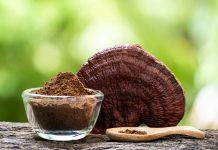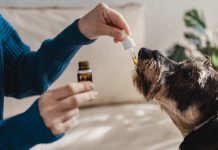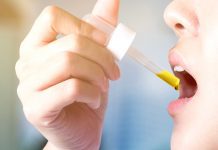
Retired rugby star and co-founder of fourfivecbd Dominic Day highlights the benefits of CBD for an active lifestyle.
Professional rugby player Dominic Day came across CBD when he went through surgery at the beginning of 2018 and the World Anti Doping Association (WADA) had removed the drug from its prohibited list. After experiencing the genuine benefits CBD offers for maintaining an active lifestyle, Day went on to establish a CBD company, fourfivecbd, with his teammate and business partner George Kruis.
As professional athletes themselves, Dominic Day and Kruis understand the importance of what they put in their bodies. They are now committed to providing the highest grade natural CBD products for athletes and active people alike through their company fourfivecbd, including 0% THC CBD oil and muscle rub, which has been rigorously tested by the Banned Substances Control Group (BSCG) for cross contamination of over 400 banned substances.
Medical Cannabis Network met with Dominic Day at the Europe Canna Expo in Dublin, where we acted as a media partner, to discuss some of the challenges involved in supplying CBD products to those involved in professional sport.
How has CBD benefited you as an athlete and as a patient?
Before I retired as a professional rugby player, I would use CBD after training to aid recovery. I would combine CBD with my normal supplemental routine, which is obviously quite important for any athlete. As soon as I introduced CBD to this routine, I saw great benefits in terms of sort of being able to train harder and push myself further. Since retirement, the main reason I take CBD is to help me sleep and to help ensure that the sleep I do have is of a good quality.
When I first heard about CBD, I tried vaping as the delivery method. Now, however, I take a 1,000mg tincture twice a day; and I also use a muscle rub.
Are there any restrictions on the use of CBD for professional athletes?
CBD was removed from the banned substance list in 2018. But our advice is to be particularly when deciding what products to use as there could be other cannabinoids in them. As such, testing is hugely important.
What advice would you give to other athletes who may be hesitant to try CBD?
For athletes there are a couple of different issues which need to be taken into consideration. They need to know what is in the product and they need to be comfortable with the brand, so we tell people to make sure that they do some research and to look at the tester’s certificate.
One thing that we have really tried to do in order to differentiate ourselves is to not only test for cannabinoids in our products, but also test for any cross contamination that may have happened. This is crucial for athletes who need to be absolutely sure that they are not taking any banned substances, even accidentally. This includes THC, but also things like steroids or growth hormones.
To achieve this, we send our products to Los Angeles: while that is an expensive process, we would not be comfortable selling our products without doing so. And, of course, we are more than happy to speak with anyone who is considering taking CBD products – and not only our own products – to explain what they should be looking for.
As you source the ingredients for your products from around Europe, do you think that Brexit will make things difficult for you moving forwards? How will other policy changes like the Novel Foods Directive impact what you are doing?
Brexit shouldn’t have too much of an impact. We are constantly looking for the best products on the market and we will only work with those companies who have a Novel Foods application. As of March 2021, anyone selling CBD will need to have made an application. But that is a positive development as we move towards standardisation.
Trying to remain compliant is an expensive process and we spend tens of thousands every year just changing labelling requirements and sourcing ingredients. But it is something which will hopefully mean that come March, when legislation begins to be enforced, we will already be compliant.
The UK’s CBD industry is largely unregulated or self-regulated: should legislation on CBD supplements be stricter?
I’m not sure that stricter laws are the right way to go. Instead, perhaps, there needs to be more education around CBD. For example, those who are breastfeeding have been advised by the Food Standards Agency (FSA) not to take CBD products and they have said that the maximum dosage should be 70mg a day. That is great because it gives us a platform to work off moving forwards. We feel that the safety profile of CBD is very good, and so there is no real need for stricter laws.
Do you think more needs to be done to stop products being sold which don’t have the advertised level of CBD in them?
Once people are used to seeing CBD products on the shelves, they are going to start understanding what the different products do and how well they will work. For example, what is the bioavailability of a tincture compared to a topical? Or what will help a topical be absorbed by the skin better? Consumer education and familiarity will be key. But for as long as that is missing, people will continue to push the boundaries with poor products or products that really have no effect.
How do you foresee the industry evolving in the future? Are things slowing down?
Things are indeed slowing down in areas such as North America and Canada. There is a sense that everyone got really excited and we saw a boom, but then the demand wasn’t there for the amount of product that was being created; supply far exceeded the demand. But in the UK, things are very different. Of course, we are a couple of years behind where the USA and Canada are at the moment, but that means that we have the chance to learn from them, and I think that people in the UK are going to enter the industry a little more tentatively. But I think that there is massive growth to come.
Do you think you think we will start to see an influx of North American and Canadian companies looking to enter the UK marketplace?
Yes, I do. I was only looking at the brands that are exhibiting at the CBD Expo, for instance, and many of them are from North America. Before, many people were a little concerned about what the FSA were going to do. But now that they are actually putting some guidelines in place, we may now start to see companies from the USA and Canada start to look at the UK market once more.
Dominic Day
fourfivecbd
fourfivecbd.co.uk
This article appeared in the second issue of Medical Cannabis Network which is out now. Click here to get your free subscription today.









